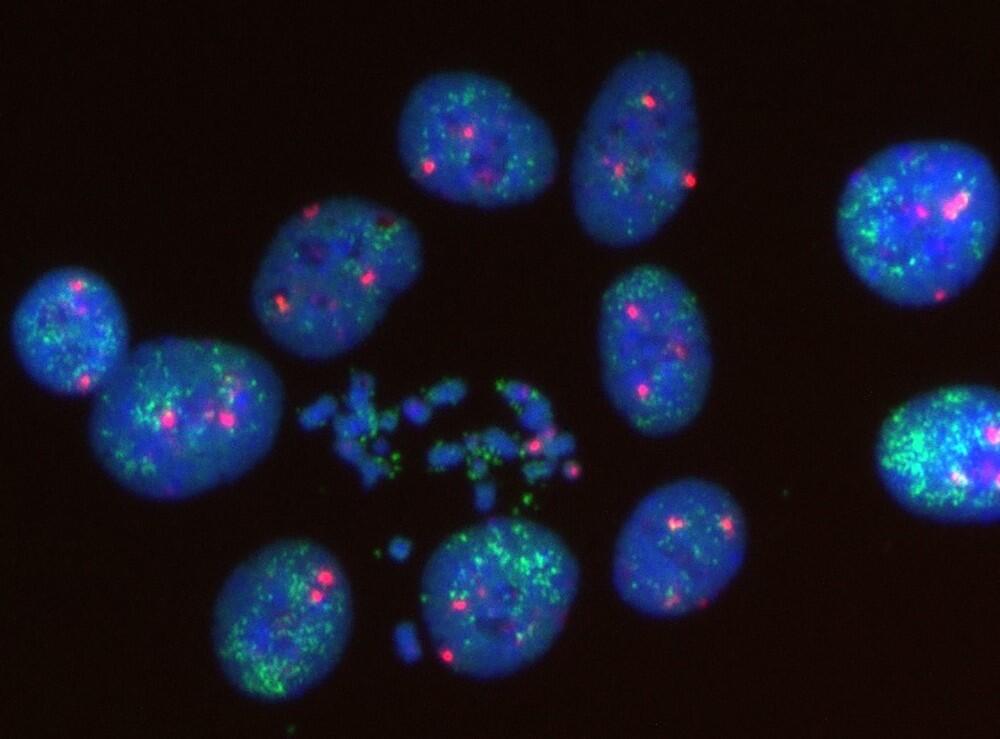26/01/2021
Print PageLord of the Rings

Cancer is a typical disease of old age. Over the course of a person’s life, changes in the body’s genetic material accumulate in the cells and become increasingly difficult to repair. Eventually, the point is reached in which a cell begins to grow and multiply uncontrollably due to the mutations.
Why even children can develop cancer is a question that has occupied Dr. Anton Henssen for some time. The 35-year-old is a scientist at the Experimental and Clinical Research Center (ECRC ), a joint institution of the Max Delbrück Center for Molecular Medicine in the Helmholtz Association (MDC) and Charité – Universitätsmedizin Berlin. Since 2019, he has been leading the Emmy Noether Research Group “Genomic Instability in Pediatric Cancer” at the Berlin-Buch campus.
Interest in circular DNA is new
Just last September, Henssen received one of the coveted Starting Grants from the European Research Council (ERC) for his research. The ERC will provide Henssen with around €1.5 million over the next five years For the “CancerCirculome” project. “The importance of circular DNA in the development of cancer is increasingly becoming a focus of scientific interest,” Henssen says. He says that when he first started getting excited about the topic, things were quite different.
“That’s another reason why I’m now very pleased to receive the Kind Philipp Award for Pediatric Oncology Research,” says Henssen, who, in addition to his work as a scientist, also practices as a pediatrician in the Division of Oncology and Hematology at Charité’s Department of Pediatrics. “The award is one of the most significant in this country in the field of pediatric oncology.”
Tiny rings disrupt genetic information
Unfortunately, due to the coronavirus pandemic, the award ceremony will not take place until sometime later this year, says Henssen. However, the foundation has already transferred the prize money of €10,000 to him. “When the current crisis is over, I will go celebrate in a big way with my research group, without which I would never have received the award,” says Henssen, who participates in the Clinician Scientist Program of the Berlin Institute of Health (BIH ) and Charité and is also a scientific member of the German Cancer Consortium (DKTK) at the Berlin site.
The Kind Philipp Award is presented each year to recognize the best work on pediatric cancer research by German-speaking authors. This time, the foundation gave the award to a study that was published in 2020 in the journal Nature Genetics. Together with Dr. Richard Koche from the Memorial Sloan Kettering Cancer Center in New York, Prof. Angelika Eggert, Director of the Division of Oncology and Hematology in Charité’s Department of Pediatrics, and 35 other researchers, Henssen showed in the publication that small DNA rings in children’s neurons can disrupt the genetic material in such a way that neuroblastoma develops.
Neuroblastoma growth accelerated
In the study, the team examined tissue samples from 93 children with neuroblastoma. The group found that circular DNA is found much more frequently and in greater complexity in tumor cells than previously assumed. In addition, the scientists were able to use their data to deduce how certain sections of genetic information detach from a chromosome, form rings and subsequently reinsert themselves elsewhere on the chromosome. “Since the original sequence of genetic information is disturbed in the process, the affected cells can easily degenerate,” Henssen explains.
Together with his team, the researcher also showed that certain DNA rings accelerate the growth of neuroblastomas. Detecting them could soon make it easier to better assess the disease progression in children. Henssen’s next goal is to precisely sequence the circular genome and identify those factors which enable the rings to form and multiply in the first place.
In this way, the researcher and physician hopes to be able to help his young patients at Charité even better than he could previously. “If we develop markers for better diagnosis and prognosis,” says Henssen, “we will be able to offer children with cancer and their parents a much more individualized and presumably more effective therapy.”
(Joint press release by the MDC, Charité and the BIH on the occasion of World Cancer Day on February 4)